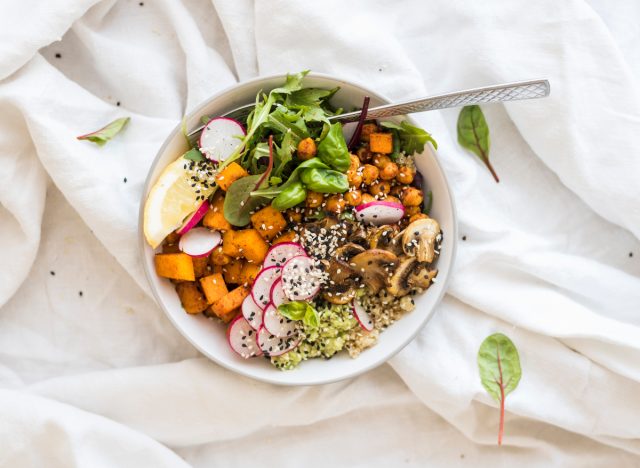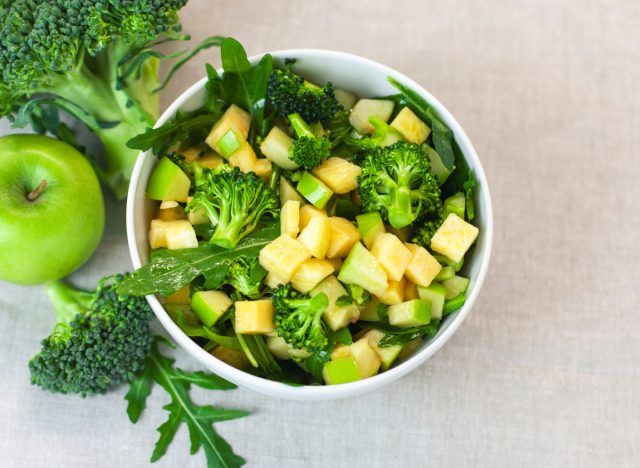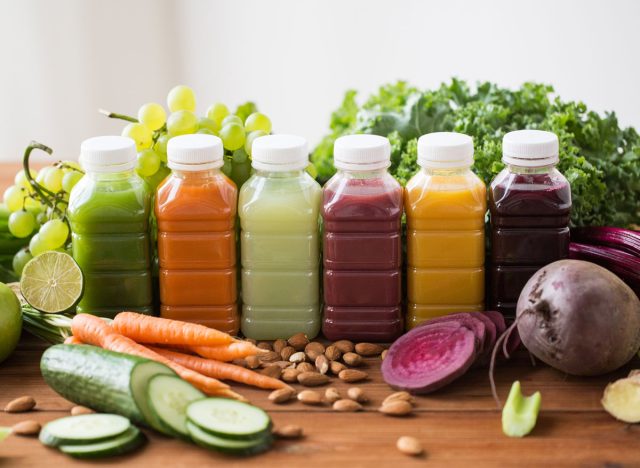5 Mistakes Women Make That Slow Their Metabolism

As you grow older, it’s crucial to maintain a healthy, fast metabolism to avoid packing on unwanted pounds. (Because nobody invited them to the party!) Unfortunately, weight gain is usually a natural part of the aging process thanks to your hormones, lifestyle changes, a decline in lean muscle mass, and a slower metabolism, The Nutrition Twins®, Tammy Lakatos Shames, RD, CDN, CFT, and Lyssie Lakatos, RD, CDN, CFT, tell Eat This, Not That! That’s why we’re here today to outline some common mistakes women make that slow their metabolism so you know exactly what to ditch and fix. Staying on top of your health, wellness, and fitness is the name of the game if you want to speed things up.
Keep reading to learn more about the critical mistakes women make that slow their metabolism, and next, don’t miss our 7 Breakfast Habits To Curb Cravings & Lose Weight.
1. Going vegan

While plant-based eating comes with various health benefits, if you ditch animal protein altogether without pinpointing other adequate sources of protein to consume in its place, you won’t get your fill of “metabolism-boosting protein.” In addition, it will be far too easy to succumb to extra calories from cereals, pasta, and other grains. “Research consistently shows that if you make this mistake and eat a high-carb diet compared to a higher protein, lower carb diet, you’ll slow your metabolism,” The Nutrition Twins note.
2. Prioritizing stretching and yoga

Let’s get one thing straight: Yoga and stretching play a key role in maintaining limber, youthful joints and muscles. But if you prioritize these forms of physical activity over strength training, The Nutrition Twins warn, “You’re missing a big piece of the metabolism/ weight loss puzzle.” They explain, “Women lose up to 8% of lean muscle tissue per decade after age 30 (and typically replace it with fat!) if we don’t strength train to stop it. It’s lean muscle mass that burns more calories than fat, even when we sleep, and day after day, this can really make a difference.”
3. Having salads as your main meals

Getting your fill of fresh fruits and leafy green veggies is an excellent thing you can do to boost your overall health. But if you’re having salads for your main meals without added protein such as cheese, an egg, or a spoonful of beans, you’re making a major error. “You’ll be skimping on the protein you need to support your lean muscle tissue, so you likely could lose metabolism-revving lean muscle tissue,” The Nutrition Twins say. “In our experience, most women benefit from about 20 grams of protein per meal.”
4. Scrolling through social media before heading to sleep

Did you know that powering down your blue light devices well before bedtime can improve your sleep and help you avoid weight gain? Well, it can, so ditch the social media scrolling, and get ready for restful Z’s.
“Not only do you stay up later and cut into precious sleep time, but blue light negatively impacts quality sleep by interfering with melatonin production and disrupting circadian rhythm,” The Nutrition Twins tell us. “One study showed that ongoing sleep restriction in combination with circadian rhythm disruption slowed resting metabolic rate by 8%.”
5. Following a juice “detox” cleanse

“If you’re hoping to jumpstart weight loss by going on juice “detox”, you may want to think again,” The Nutrition Twins warn. Many of these cleanses don’t offer sufficient protein to help with your lean muscle mass and are low in the calorie department. This means you’ll begin using muscle tissue for energy.
“Your body will reduce the amount of calories it expends as a protective mechanism to prevent starvation, so your metabolism will start to take a hit,” The Nutrition Twins add. “This metabolic slowdown is very similar to what happens when you eat a diet that is below 1200 calories for a prolonged amount of time.”









